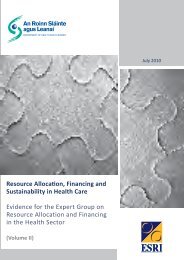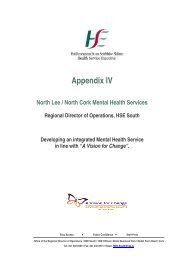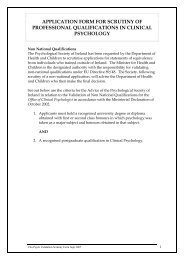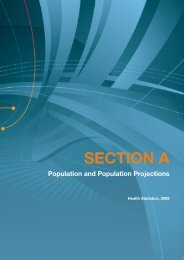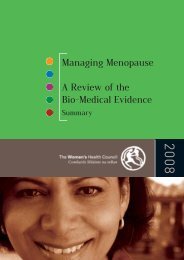Brennan Report - Department of Health and Children
Brennan Report - Department of Health and Children
Brennan Report - Department of Health and Children
Create successful ePaper yourself
Turn your PDF publications into a flip-book with our unique Google optimized e-Paper software.
Chapter 8 Audit ReformCHAPTER 8AUDIT REFORMIn this Chapter, we look in detail at a range <strong>of</strong> issues related to audit functions <strong>and</strong> responsibilities in the healthservice.8.1 OVERVIEWA wide range <strong>of</strong> internal <strong>and</strong> external auditing reforms are necessary so that expenditure iscontrolled <strong>and</strong> assessed in a manner consistent with modern commercial practice. Given thescale <strong>of</strong> on-going investment in the health service, reforms will be required in the accountingst<strong>and</strong>ards throughout the health service. The improved systems <strong>of</strong> checks <strong>and</strong> balances will haveto include changes in risk assessment <strong>and</strong> management. We also recommend that the newsystems <strong>of</strong> control for the health service should include measures to protect against fraud.Consistent with modern commercial best practice, it is imperative that the health service, aspart <strong>of</strong> its general governance arrangements, ensure that strong audit committees exist,appropriate external <strong>and</strong> internal audit arrangements are in place <strong>and</strong>, in terms <strong>of</strong> enforcement,that there is a clear <strong>and</strong> unambiguous policy on fraud.8.2 AUDIT COMMITTEESLegislation governing health boards provides for reserved functions <strong>of</strong> the boards, with all otherfunctions being executive functions <strong>of</strong> the CEO. <strong>Health</strong> boards may not issue a direction to theCEO in relation to executive functions but the CEO must give the board <strong>of</strong> the health boardinformation sought by them in relation to these functions.Best practice requires organisations to establish audit committees chaired by an independentnon-executive Chairman. External auditors <strong>and</strong> internal auditors should report to the auditcommittee. If necessary, legislation should be amended to ensure that the reserved functions<strong>of</strong> health boards <strong>and</strong> health board CEO executive functions support implementation <strong>of</strong> bestpractice in relation to audit committees <strong>of</strong> health boards. However, we believe that healthboards could voluntarily adopt many aspects <strong>of</strong> best practice in relation to audit committeeswithout a change in legislation.All health boards should establish an audit committee. These audit committees should:●●●Comprise at least three non-executive directors.Have written terms <strong>of</strong> reference dealing clearly with authority <strong>and</strong> duties.Duties should include reviewing:◆ Scope <strong>and</strong> results <strong>of</strong> audit;◆ Cost effectiveness <strong>of</strong> audit; <strong>and</strong>◆ Independence <strong>and</strong> objectivity <strong>of</strong> auditors.Members <strong>of</strong> management are not normally members <strong>of</strong> audit committees but frequently arerequired to attend meetings to provide the committee with any information required. Thepowers <strong>and</strong> functions <strong>of</strong> the audit committee, as set out in its charter or written terms <strong>of</strong>reference, should be adopted by the board.The main function <strong>of</strong> an audit committee is to reassure the board on the system <strong>of</strong> internal99



